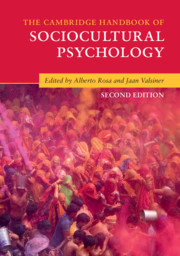Book contents
- The Cambridge Handbook of Sociocultural Psychology
- The Cambridge Handbook of Sociocultural Psychology
- Copyright page
- Contents
- Figures
- Tables
- Contributors
- Editors’ Introduction
- Part I Theoretical and Methodological Issues
- Part II Action, Objects, Artifacts, and Meaning
- Part III The Agent Rises a Reflective Self: Education and Development
- Part IV Institutional Artifacts for Value
- Part V Aesthetic and Religious Experiences
- Part VI Practices and Artifacts for Imagining Identity
- 22 Imaginative Processes and the Making of Collective Realities in National Allegories
- 23 National Identities in the Making and Alternative Pathways of History Education
- 24 The Politics of Representing the Past: Symbolic Spaces of Positioning and Irony
- 25 Beyond Historical Guilt: Intergenerational Narratives of Violence and Reconciliation
- 26 Psytizenship: Sociocultural Mediations in the Historical Shaping of the Western Citizen
- Part VII Experiences Make the Person
- General Conclusion
- Index
- References
26 - Psytizenship: Sociocultural Mediations in the Historical Shaping of the Western Citizen
from Part VI - Practices and Artifacts for Imagining Identity
Published online by Cambridge University Press: 25 June 2018
- The Cambridge Handbook of Sociocultural Psychology
- The Cambridge Handbook of Sociocultural Psychology
- Copyright page
- Contents
- Figures
- Tables
- Contributors
- Editors’ Introduction
- Part I Theoretical and Methodological Issues
- Part II Action, Objects, Artifacts, and Meaning
- Part III The Agent Rises a Reflective Self: Education and Development
- Part IV Institutional Artifacts for Value
- Part V Aesthetic and Religious Experiences
- Part VI Practices and Artifacts for Imagining Identity
- 22 Imaginative Processes and the Making of Collective Realities in National Allegories
- 23 National Identities in the Making and Alternative Pathways of History Education
- 24 The Politics of Representing the Past: Symbolic Spaces of Positioning and Irony
- 25 Beyond Historical Guilt: Intergenerational Narratives of Violence and Reconciliation
- 26 Psytizenship: Sociocultural Mediations in the Historical Shaping of the Western Citizen
- Part VII Experiences Make the Person
- General Conclusion
- Index
- References
- Type
- Chapter
- Information
- The Cambridge Handbook of Sociocultural Psychology , pp. 479 - 500Publisher: Cambridge University PressPrint publication year: 2018
References
- 2
- Cited by

